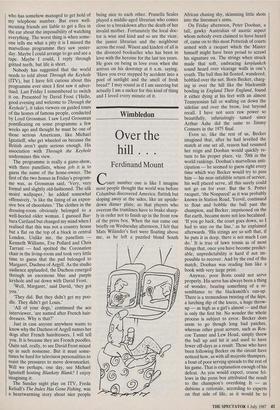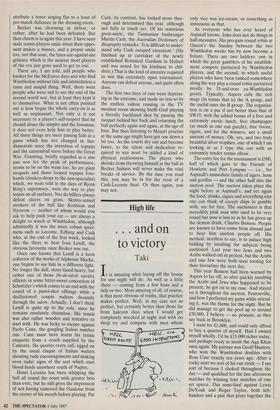Wimbledon
Over the hill . . .
Ferdinand Mount
Court number one is like I imagine most people thought the world was before Columbus discovered America: flattish but sloping away at the sides, like an upside- down dinner plate, so that players who overrun the tramlines have to brake sharp- ly in order not to finish up in the front row of the press box. When the sun came out briefly on Wednesday afternoon, I felt that Mats Wilander's feet were floating above me, as he left a puzzled blond South African chasing shy, skimming little shots into the linesman's arms.
On Friday afternoon, Peter Doohan, a tall, gawky Australian of ascetic aspect whom nobody even claimed to have heard of, came on to this most Potterish of courts armed with a racquet which the Master himself might have been proud to scrawl his signature on. The strings when struck made that soft, embracing kerplunkch sound heard over vicarage walls in one's youth. The ball thus hit floated, wandered, bobbled over the net. Boris Becker, charg- ing in over the hill like the blacksmith bowling in England Their England, found it either dying at his feet with an almost Tennysonian fall or wafting on down the sideline and over the brow, lost beyond recall. I have not seen raw power so beautifully, infuriatingly tamed since Arthur Ashe did the same to Jimmy Connors in the 1975 final.
Even so, like the rest of us, Becker imagined that, after he had levelled the match at one set all, reason had resumed her reign and Doohan would quickly re- turn to his proper place, viz. 70th in the world rankings. Doohan's marvellous anti- cipation — he seemed to guess right every time which way Becker would try to pass him — his near-infallible return of service, his well placed serve, all this surely could not go on for ever. But the S. Potter racquet, the Nonpareil' as it was probably known in Station Road, Yeovil, continued to float and bobble the ball past the champion, and Becker, imprisoned on the flat earth, became more not less becalmed. `If you go back, the court goes down, so I had to stay on the line,' as he explained afterwards. 'His strings are so soft that, if he puts it in deep, there is not much I can do.' It is true of lawn tennis as of most things that, once you have become predict- able, unpredictability is hard if not im- possible to recover. And by the end of the match, Doohan was reading him like a book with very large print.
Anyway, poor Boris could not serve properly. His serve has always been a thing of wonder, bearing something of a re- semblance to the blacksmith's run-up. There is a tremendous twisting of the hips, a lurching dip of the knees, a huge throw- up — as high as a girl's almost — and that is only the first bit. No wonder the whole process is subject to error. Becker does seem to go though long bad patches, whereas other great servers, such as Ros- coe Tanner and Lew Hoad, simply threw the ball up and hit it and used to have fewer off-days as a result. Those who have been following Becker on the circuit have noticed how, as with all majestic thumpers, a bout of poor serving spreads to the rest of his game. That is explanation enough of his defeat. As you would expect, coarse fel- lows in the press box attributed the result to the champion's overdoing It — as dubious a rationale, according to experts on that side of life, as it would be to attribute a tenor singing flat to a bout of pre-match dalliance in the dressing-room.
Becker was charming in defeat, or rather, after he had been defeated. But then charm is in again this year. I have seen male tennis players smile when their oppo- nent makes a winner, and a proper smile too, not that sour, the fates-are-against-me grimace which is the nearest most players of the era just gone used to get to one.
There are, I am told, still people who hanker for the McEnroe days and who find Wimbledon without bile and intimidation a tame and insipid thing. Well, there were people who were sad to see the end of the second world war, but at least they kept it to themselves. What is not often pointed out is how bogus the whole carry-on is as well as unpleasant. Not only is it not necessary to a player's self-respect that he should abuse the umpire and the linesman; it does not even help him to play better. All these things are mere passing fads in a game which has not changed in fun- damentals since the invention of topspin and the cannonball serve before the Great War. Grunting, briefly regarded as a sine qua non for the peak of performance, seems to be on the wane too. So are giant racquets and those looped topspin fore- hands (donkey-drops to the non-specialist) which, we were told in the days of Bjorn Borg's supremacy, were the way to play tennis on all surfaces. Nor do biffers always defeat slicers on grass. Skinny-armed strokers of the ball like Krishnan and Nystrom — neither of whom would you ask to help push your car — are always a delight to watch at Wimbledon, although admittedly it was the more robust speci- mens such as Leconte, Edberg and Cash who, at the end of the first week, looked like the three to beat Ivan Lendl, the obvious favourite once Becker was out.
Once one knows that Lend! is a keen collector of the works of Alphonse Mucha, one begins to see him in a different light. No longer the dull, stony-faced heavy, but rather one of those fin-de-siecle cavalry officers in some bitter-sweet concoction of Schnitzler's which comes to an end with the sound of a pistol-shot offstage while a disillusioned couple waltzes dreamily through the salon. Actually, I don't think Lendl is quite up to the role, since he remains resolutely charmless. His tennis was also rather wooden and tentative to start with. He was lucky to escape against Paolo Cane, the gangling Italian number one. Cane must have learnt his tennis etiquette from a coach supplied by the Camorra. He queries every call, egged on by the usual claque of Italian waiters shouting rude encouragements and making even ruder signs of the sort which start blood feuds anywhere south of Naples.
Henri Leconte has been whipping the ball all round the court with greater brio than ever, but he still gives the impression of not having removed the Gauloise from the corner of his mouth before playing. Pat Cash, by contrast, has looked more thor- ough and determined this year, although not fully in touch yet. Of his notorious great-uncle, the Tasmanian bushranger Martin Cash, the Australian Dictionary of Biography remarks: 'It is difficult to under- stand why Cash escaped execution.' (He finished up as caretaker of the newly established Botanical Gardens in Hobart and was noted for his kindness to chil- dren.) That is the kind of ancestry required to win this extremely open tournament. Anyone can defeat anyone, and quite often does.
The first two days of rain were depress- ing in the extreme, and made no less so by the endless videos running in the TV monitor room showing Steffi Graf playing a literally backhand shot by passing the racquet behind her back and returning the ball perfectly again and again, at the age of four. But then listening to Mozart practise at the same age might have got one down a bit too. As the courts dry out and become faster, to the talent and dedication re- quired to win must be added a kind of physical recklessness. The player who shrinks from throwing himself at the ball in Becker fashion will never make the vital breaks of service. By the time you read this, you may be in for the treat of a Cash-Leconte final. Or then again, you may not.



















































 Previous page
Previous page